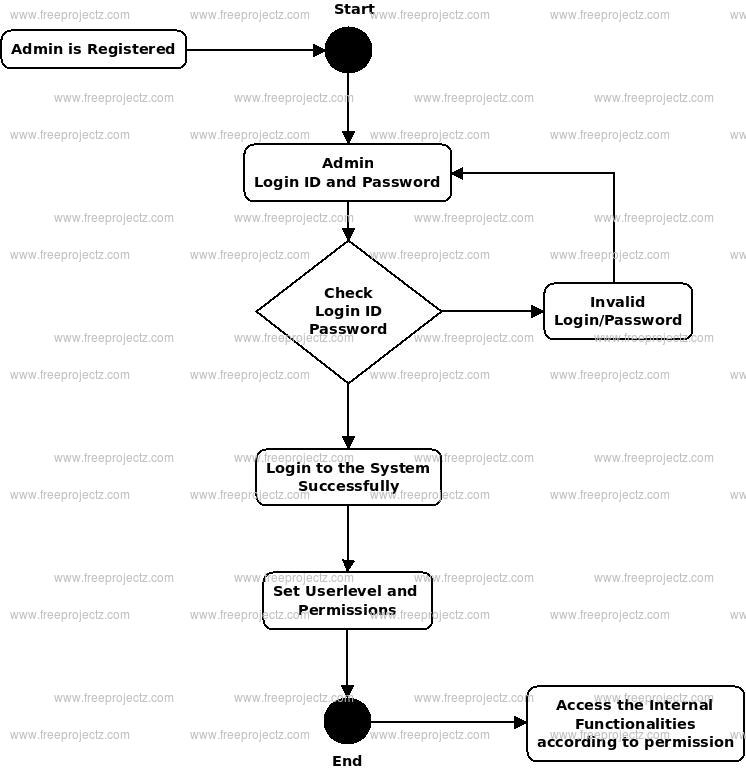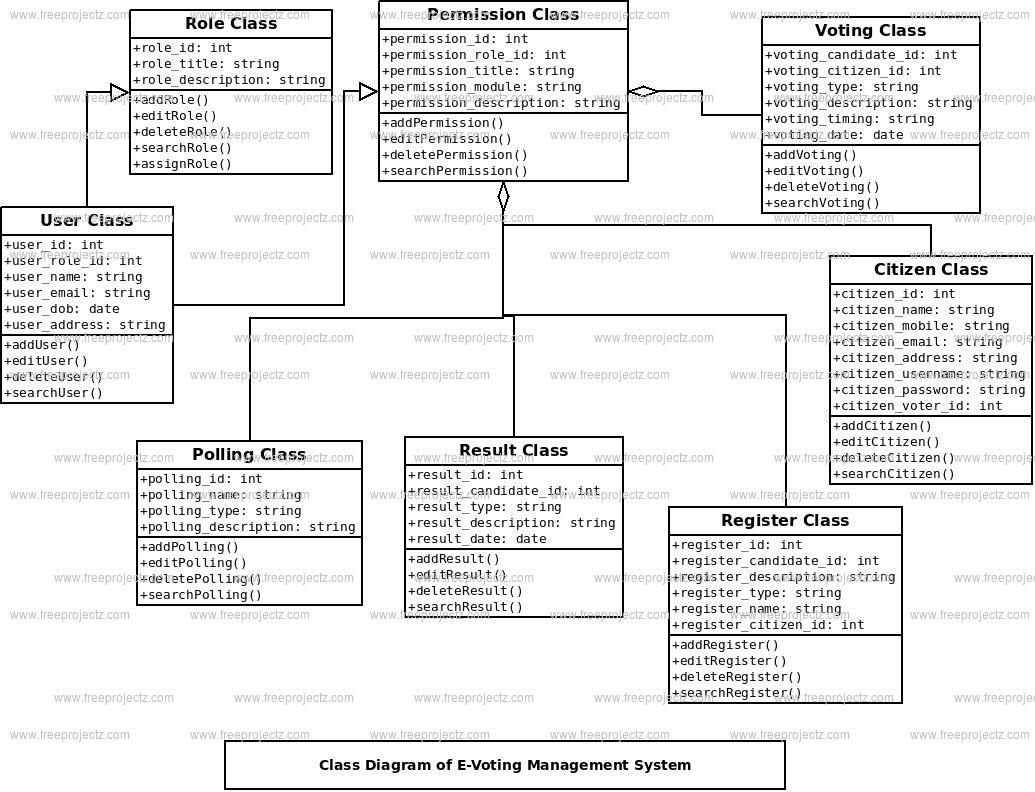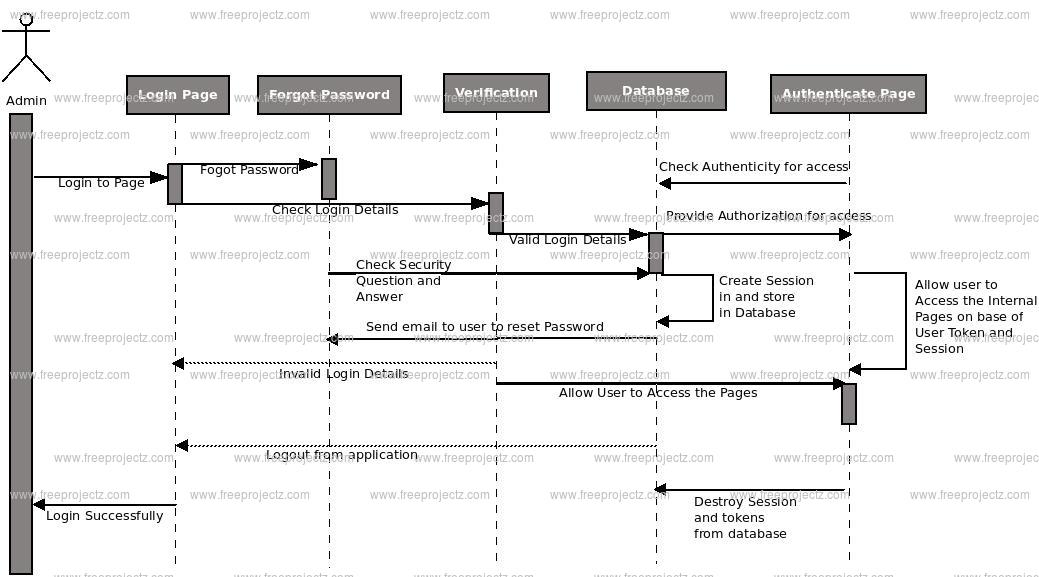- Posted By: freeproject
- Comments: 0
- Posted By: freeproject
- Comments: 0
E-Voting Management System Activity Diagram
This is the Activity UML diagram of E-Voting Management System which shows the flows between the activity of Register, , Citizen, Result, Candidate. The main activity involved in this UML Activity Diagram of E-Voting Management System are as follows:
- Register Activity
- Activity
- Citizen Activity
- Result Activity
- Candidate Activity
Features of the Activity UML diagram of E-Voting Management System
- Admin User can search Register, view description of a selected Register, add Register, update Register and delete Register.
- Its shows the activity flow of editing, adding and updating of
- User will be able to search and generate report of Citizen, Result, Candidate
- All objects such as ( Register, , Candidate) are interlinked
- Its shows the full description and flow of Register, Result, Candidate, Citizen,

Login Activity Diagram of E-Voting Management System:
This is the Login Activity Diagram of E-Voting Management System, which shows the flows of Login Activity, where admin will be able to login using their username and password. After login user can manage all the operations on Citizen, Register, , Candidate, Result. All the pages such as , Candidate, Result are secure and user can access these page after login. The diagram below helps demonstrate how the login page works in a E-Voting Management System. The various objects in the Candidate, Citizen, Register, , and Result page—interact over the course of the Activity, and user will not be able to access this page without verifying their identity.

- Posted By: freeproject
- Comments: 0
E-Voting Management System Class Diagram
E-Voting Management System Class Diagram describes the structure of a E-Voting Management System classes, their attributes, operations (or methods), and the relationships among objects. The main classes of the E-Voting Management System are Voting, Register, Candidate, Citizen, Polling, Result.
Classes of E-Voting Management System Class Diagram:
- Voting Class : Manage all the operations of Voting
- Register Class : Manage all the operations of Register
- Candidate Class : Manage all the operations of Candidate
- Citizen Class : Manage all the operations of Citizen
- Polling Class : Manage all the operations of Polling
- Result Class : Manage all the operations of Result
Classes and their attributes of E-Voting Management System Class Diagram:
- Voting Attributes : voting_candidate_id, voting_citizen_id, voting_date, voting_type, voting_timing, voting_description
- Register Attributes : register_id, register_candidate_id, register_citizen_id, register_name, register_type, register_description
- Candidate Attributes : candidate_id, candidate_voter_id, candidate_name, candidate_mobile, candidate_email, candidate_username, candidate_password, candidate_address
- Citizen Attributes : citizen_id, citizen_voter_id, citizen_name, citizen_mobile, citizen_email, citizen_username, citizen_password, citizen_address
- Polling Attributes : pooling_id, pooling_name, pooling_type, pooling_description
- Result Attributes : result_id, result_candidate_id, result_date, result_type, result_description
Classes and their methods of E-Voting Management System Class Diagram:
- Voting Methods : addVoting(), editVoting(), deleteVoting(), updateVoting(), saveVoting(), searchVoting()
- Register Methods : addRegister(), editRegister(), deleteRegister(), updateRegister(), saveRegister(), searchRegister()
- Candidate Methods : addCandidate(), editCandidate(), deleteCandidate(), updateCandidate(), saveCandidate(), searchCandidate()
- Citizen Methods : addCitizen(), editCitizen(), deleteCitizen(), updateCitizen(), saveCitizen(), searchCitizen()
- Polling Methods : addPolling(), editPolling(), deletePolling(), updatePolling(), savePolling(), searchPolling()
- Result Methods : addResult(), editResult(), deleteResult(), updateResult(), saveResult(), searchResult()
Class Diagram of E-Voting Management System :

- Posted By: freeproject
- Comments: 0
E-Voting Management System Component Diagram
This is a Component diagram of E-Voting Management System which shows components, provided and required interfaces, ports, and relationships between the Result, Citizen, Voting, Candidate and . This type of diagrams is used in Component-Based Development (CBD) to describe systems with Service-Oriented Architecture (SOA). E-Voting Management System UML component diagram, describes the organization and wiring of the physical components in a system.
Components of UML Component Diagram of E-Voting Management System:
- Result Component
- Citizen Component
- Voting Component
- Candidate Component
- Component
Featues of E-Voting Management System Component Diagram:
- You can show the models the components of E-Voting Management System.
- Model the database schema of E-Voting Management System
- Model the executables of an application of E-Voting Management System
- Model the system's source code of E-Voting Management System

- Posted By: freeproject
- Comments: 0
E-Voting Management System ER Diagram
This ER (Entity Relationship) Diagram represents the model of E-Voting Management System Entity. The entity-relationship diagram of E-Voting Management System shows all the visual instrument of database tables and the relations between Register, Citizen, Voting, Result etc. It used structure data and to define the relationships between structured data groups of E-Voting Management System functionalities. The main entities of the E-Voting Management System are Voting, Register, Candidate, Citizen, Polling and Result.
E-Voting Management System entities and their attributes :
- Voting Entity : Attributes of Voting are voting_candidate_id, voting_citizen_id, voting_date, voting_type, voting_timing, voting_description
- Register Entity : Attributes of Register are register_id, register_candidate_id, register_citizen_id, register_name, register_type, register_description
- Candidate Entity : Attributes of Candidate are candidate_id, candidate_voter_id, candidate_name, candidate_mobile, candidate_email, candidate_username, candidate_password, candidate_address
- Citizen Entity : Attributes of Citizen are citizen_id, citizen_voter_id, citizen_name, citizen_mobile, citizen_email, citizen_username, citizen_password, citizen_address
- Polling Entity : Attributes of Polling are pooling_id, pooling_name, pooling_type, pooling_description
- Result Entity : Attributes of Result are result_id, result_candidate_id, result_date, result_type, result_description
Description of E-Voting Management System Database :
- The details of Voting is store into the Voting tables respective with all tables
- Each entity (Result, Candidate, Polling, Register, Voting) contains primary key and unique keys.
- The entity Candidate, Polling has binded with Voting, Register entities with foreign key
- There is one-to-one and one-to-many relationships available between Polling, Citizen, Result, Voting
- All the entities Voting, Polling, Candidate, Result are normalized and reduce duplicacy of records
- We have implemented indexing on each tables of E-Voting Management System tables for fast query execution.

- Posted By: freeproject
- Comments: 0
E-Voting Management System Sequence Diagram
This is the UML sequence diagram of E-Voting Management System which shows the interaction between the objects of , Register, Voting, Result, Candidate. The instance of class objects involved in this UML Sequence Diagram of E-Voting Management System are as follows:
- Object
- Register Object
- Voting Object
- Result Object
- Candidate Object
Login Sequence Diagram of E-Voting Management System:
This is the Login Sequence Diagram of E-Voting Management System, where admin will be able to login in their account using their credentials. After login user can manage all the operations on Voting, , Register, Candidate, Result. All the pages such as Register, Candidate, Result are secure and user can access these page after login. The diagram below helps demonstrate how the login page works in a E-Voting Management System. The various objects in the Candidate, Voting, , Register, and Result page—interact over the course of the sequence, and user will not be able to access this page without verifying their identity.

This is the UML sequence diagram of E-Voting Management System which shows the interaction between the objects of , Register, Voting, Result, Candidate. The instance of class objects involved in this UML Sequence Diagram of E-Voting Management System are as follows:
- Object
- Register Object
- Voting Object
- Result Object
- Candidate Object

- Posted By: freeproject
- Comments: 0
E-Voting Management System Use Case Diagram
This Use Case Diagram is a graphic depiction of the interactions among the elements of E-Voting Management System. It represents the methodology used in system analysis to identify, clarify, and organize system requirements of E-Voting Management System. The main actors of E-Voting Management System in this Use Case Diagram are: Super Admin, System User, Voter, Candidate, who perform the different type of use cases such as Manage Voting, Manage Register, Manage Candidate, Manage Citizen, Manage Polling, Manage Result, Manage, Manage Users and Full E-Voting Management System Operations. Major elements of the UML use case diagram of E-Voting Management System are shown on the picture below.
The relationships between and among the actors and the use cases of E-Voting Management System:
- Super Admin Entity : Use cases of Super Admin are Manage Voting, Manage Register, Manage Candidate, Manage Citizen, Manage Polling, Manage Result, Manage, Manage Users and Full E-Voting Management System Operations
- System User Entity : Use cases of System User are Manage Voting, Manage Register, Manage Candidate, Manage Citizen, Manage Polling, Manage Result, Manage
- Voter Entity : Use cases of Voter are Vote to Candidate, Check Vote, Search Candidate
- Candidate Entity : Use cases of Candidate are Check Votes, Update Profile, Voting Reports
Use Case Diagram of E-Voting Management System :




















